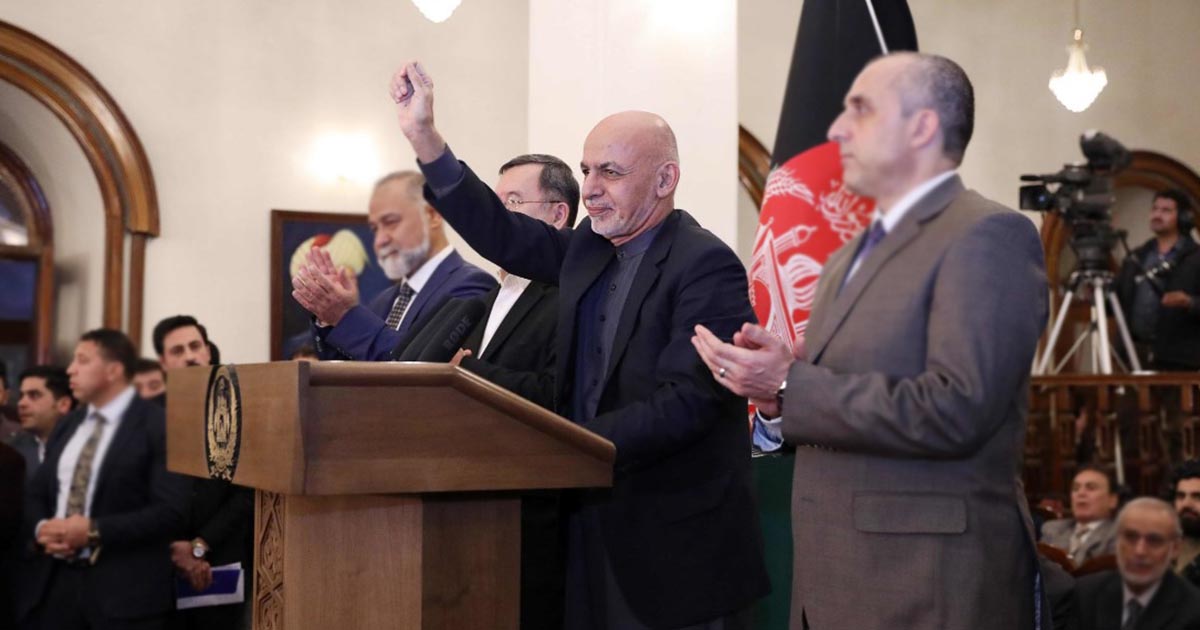In Afghan Presidential elections, people have elected Ashraf Ghani once again. Soon after wining elections, AFGHAN President Ghani offered an olive branch to the Taliban. As Afghan government’s new leader wants to talk to Afghan Taliban to finalize the peace deal.
An evidently confident Ghani embraced his supporters at the highly guarded Arg palace in the capital Kabul after the long awaited results of last September’s election were announced.
“The government’s arms are open to Taliban and other groups. We want peace and sustainable peace. And, God willing this team would bring peace to Afghanistan,” said the 70-year-old former World Bank economist.
The civil war of 1990s in Afghanistan involved ethnic groups. Post 9/11, US allied with Northern Group who fought with Afghan Taliban
Earlier on Tuesday, announcing the results, Hava Alam Nuristani, the female chief election commissioner, said Ghani has secured the required minimum of 50 per-cent-plus votes to secure the top office.
AFGHAN President Ghani won with a 50.64% lead, leaving no room for an election rerun.
His main rival, Chief Executive Abdullah Abdullah came second with 39.5% of votes and veteran Mujahideen leader Gulbuddin Hekmatyar gained 3.8% of the total vote cast. Both rejected the initial results.
Congratulations to the whole Afghan Nation!!!
Dr. Ashraf Ghani become the President of Afghanistan for second time by winning the Presidential elections by 50.64%. pic.twitter.com/bzB0LyanVB
— Riaz Nasiry (@NasiryRiaz) February 19, 2020
Abdullah on Tuesday called the results “illegal, a coup against democracy, and national treason”. He announced to form a parallel government dubbed as ‘inclusive government’ by declaring his Peace and Stability team as the winner.
Similarly troubled presidential polls in 2014 delivered a weak and divided national unity government under Ghani and Abdullah, when the country was pushed to the edge of disorder amid withdrawal of some 100,000 foreign troops
Read more: Ashraf Ghani: from academia to the Afghan presidency
Afghan Peace Deal, only between US and Taliban
US is negotiating a peace deal with Afghan Taliban, which spectators say is going to be successful. But the Afghan government is not part of this deal between the U.S. and the Taliban. In such case the success of the deal is highly doubtful.
If the Taliban do not go on to meet with the Afghan government. But forcing the Taliban, compelling the Taliban after they signed a deal with the United States to then meet with the Afghan government and other elements of Afghan society has been a critical component of this negotiation.
The whole reason that Ambassador Khalilzad and the United States as a whole embarked on negotiations bilaterally with the Taliban was so that they would go on to meet with the Afghan government. The idea has never been that we are going to sign agreement with the Taliban, and we are simply going to leave. Pakistan is also pursuing Afghan taliban to talk to Afghan President Ashraf Ghani.
Afghan Government Says Taliban To Reduce Violence Within Five Days Under Peace Deal https://t.co/9g3K5DHIUQ
— 🇺🇦🐱 https://mas.corq.co/@rogue_corq 🏳️🌈🇺🇦 (@rogue_corq) February 19, 2020
That agreement is conditional, and it’s conditioned upon several things. It’s conditioned upon the Taliban meeting counter-terrorism guarantees -making sure that they’re not going to continue it- guaranteeing they will not continue to help or work with al-Qaida and other terrorist organizations and not let them do anything against the United States. Secondly, it’s conditioned upon the meeting with the Afghan government and other elements of Afghan society to reach a real settlement to this conflict.
Read more: Afghan Taliban in Islamabad: Pakistan’s Role in Regional Peace
The Ethnic Issue in the Afghan Crisis
It must be noted here that Afghan crisis has its root in ethnic division. The civil war of 1990s in Afghanistan involved ethnic groups. Post 9/11, US allied with Northern Group who fought with Afghan Taliban. Afghan Taliban are mainly Pashtuns where as Northern Alliance consists of other ethnic groups of Aghanistan. Today, government of Afghan government excludes Pashtuns as it is government of Northern alliance.
This is one of the reason why Afghan Taliban do not want to hold talks with the Kabul government. If the deadlock continues there is a high chance that Afghan peace may not come soon.
GVS News Desk with inputs from Anadolu.














